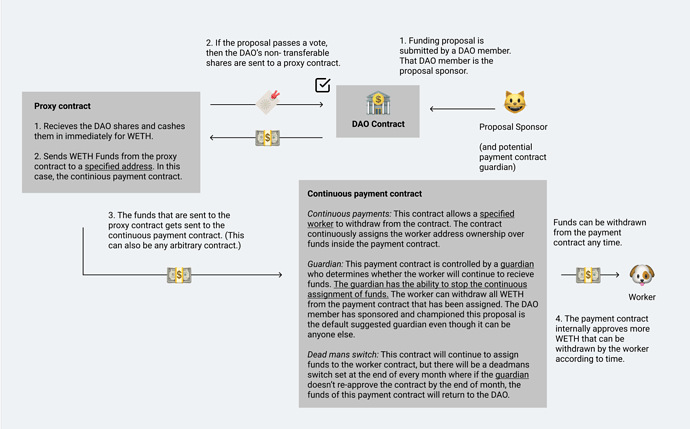As you’re all probably very aware, @pet3rpan has forked Moloch and convinced a bunch of us to create a Metacartel DAO. It now has about less than 20 members and about $200-250k on it. Peter can give the exact amounts. While it’s a great achievement it’s by no means a fortune and we have a limited window of attention to turn it into something great.
Compared to other projects, it starts short on cash and short on time, but it is still abundant in it’s ability to cause impact. That is why I propose that the first round of funding should go on the DAO itself, to increase it, build on the basic Moloch game theory and conquer it’s own personality. Here are the main changes I believe should be worked on:
1. Grant tokens in small continuous amounts
Every proposal would have 3 main asks: a (smaller) amount of upfront tokens, a rate in which new tokens are paid over time and a deadline at which that rate ends. The amount of tokens anyone has at any given point, for all practical purposes (ragequit, voting, etc) are always set at (amount of tokens in balance) + (rate of new tokens) * ( ( current time or the end of contract, whichever is smaller) - (last date in which the rate was changed)). While tokens that were given cannot be taken away, the rate of new tokens can be changed at any time, via the normal proposal mechanism. It creates the following incentives:
-
Grantees are “contracted” and paid continuously over time, but they can be “fired” at any moment (with the proper notice being the usual time delays required for voting a proposal), creating a better incentive for responsible, long term and mutually benefitial relationships between grantees and the DAO.
-
All relationships have a deadline so the default action if noone is taken is to end any relationship (grantee or member) that doesn’t bother to justify it’s own value
-
Inactive Members are diluted away. In the beginning, all members getting 100 shares or 1 share per day is identical for all voting matters. But over time, as new shares are continuously given and some members are dropped off, then the old shares of inactive members are dilluted in their power, therefore guaranteeing that the most active voting power remains to current members, not only founders who have long gone
-
It’s more in line with current experiments that are gathering attention, like Vitalik’s DAICO, or Andrew Yang’s push for Basic Income and therefore is more likely to capture the public’s mind and be more aligned with future use cases
-
It’s very easy to implement. Really, it’s a few extra lines of code, I can do the basic changes myself (but it’s better to add more automated tests)
Other possible improvements are…
2) Allow multiple tokens to be used
This is specially relevant with the previous point. If the DAO can use the power of a continuously interest paying token like cDAI, then it would make even more sense for it to pay in a continuous aspec. We can even imagine a scenario in the future that the DAO has enough cash to be able to fund projects forever with just the interest
3) Experiment with more voting schemas
Traditionally in schemes like these, only a small amount of the total members are active, but with a few governance experiments we can make sure that votes are still aligned with the overall will of all members. For instance, what if when a proposal is rejected, all the members who voted against it have their shares slashed by 1-5%, while those who successfully predicted the result by voting with it have their shares increased? What if we experiment with liquid delegate voting or other continuous models? Or also go with the continuous voting system and try “conviction voting”. This is an area in which I don’t claim to know the answers but I would love to see more participation
Who would the money actually go to?
The one and only Austin Griffith, of course! This is where we can kill two stones with a single bird (or something like that): Austin has experience building continuous payments schemes, and has a great track record at making acessible experiments, and he just happens to be available and looking to work in open source community funded experiments. So we pay Austin for a few months of work to build this our current Vanilla Moloch DAO into something unique.


